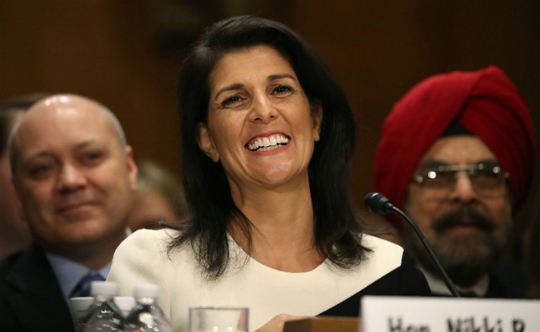Washington, Jan 25: The Senate confirmed President Donald Trump's pick for US ambassador to the United Nations by a decisive margin on Tuesday as Republican-led committees paved the way for three more of his Cabinet nominees to be approved just days into the new administration. South Carolina Governor Nikki Haley won strong support for the UN post despite her lack of foreign policy experience. Senators voted 96-4 on Ms Haley's nomination. Senator Bob Corker of Tennessee, the Republican chairman of the Foreign Relations Committee, said Ms Haley is a proven leader who will be a "fierce advocate" at the UN for American interests.

But not everyone was sold. Senator Chris Coons, D-Del., said Ms Haley didn't convince him that she'll serve effectively. The US ambassador to the international body should be an expert on international affairs, Mr Coons said, "not someone who will be learning on the job."
A Senate vote is expected soon on Mr Trump's choice for secretary of state, former Exxon Mobil CEO Rex Tillerson. The Foreign Relations Committee narrowly approved his nomination Monday, 11-10. No Democrats on the panel voted for Mr Tillerson.
Mr Tillerson's bid got a key boost when Senator Joe Manchin, D-W.Va, announced his support Tuesday. Mr Manchin, who faces re-election in 2018 in a state that backed Mr Trump heavily in the presidential election, said Mr Tillerson's extensive business career "will bring a unique perspective to the State Department."
The vote on Ms Haley capped a day when the GOP-led panels endorsed Mr Trump's choices to lead the Transportation, Housing, and Commerce departments. Yet congressional Republicans criticized Democrats for not moving quickly enough on all of the president's selections.
Senator Dianne Feinstein of California, the top Democrat on the Senate Judiciary Committee, forced a one-week delay - until January 31 - of the committee's vote on Mr Trump's attorney general nominee, Senator Jeff Sessions.
Ms Feinstein said senators "owe it" to the more than 1 million women who marched in Washington and other locations on Saturday to be careful in considering Sessions' nomination and his willingness to protect equal rights. She also said the committee received 188 pages of new material that needs to be reviewed. Committee rules allow any member of the panel to delay a vote.
Deliberations over two of Mr Trump's picks turned testy as both nominees faced questions from Democrats over their personal finances. Rep. Tom Price, R-Ga., the president's choice for health secretary, defended his decision to invest in health care companies as he testified before the Senate Finance Committee.
Panel staffers found Mr Price undervalued around 400,000 shares of stock in Australian drug company Innate Immunotherapeutics that he purchased last August. He reported the shares were valued at $50,000 to $100,000, but those shares were worth up to $250,000. Mr Price blamed a "clerical error" and answered "no" when Sen. Ron Wyden, D-Ore., asked if he'd used poor judgment.
Senator Bernie Sanders, I-Vt., said Mr Trump's nominee for budget director, South Carolina Rep. Mick Mulvaney, should be disqualified because he failed to pay more than $15,000 in payroll taxes for a babysitter more than a decade ago. Mr Mulvaney said he discovered the unpaid taxes while preparing for the nominating process. He has since paid the taxes.
Mr Trump's choice for education secretary, Betsy DeVos, is also being scrutinised by Democrats about her qualifications, political donations and longtime work advocating for charter schools and school choice in her home state of Michigan.
Sen. Gary Peters, D-Mich., delivered a withering critique of DeVos on Tuesday, saying he has no confidence she will fully support traditional public schools and students.
The Senate Commerce Committee approved by voice votes Mr Trump's choices of conservative billionaire investor Wilbur Ross to run the Commerce Department and Elaine Chao to lead the Transportation Department.
Mr Ross has specialized in buying distressed companies that still have a potential for delivering profits. He has known Mr Trump for more than 20 years, was an early supporter of his presidential campaign and served as an economic policy adviser to Mr Trump's team.
Ms Chao, an experienced Washington hand, was labor secretary in President George W Bush's administration and deputy transportation secretary under President George HW Bush. She is also the wife of Senate Majority Leader Mitch McConnell of Kentucky.
Ms Chao is expected to play a major role in Mr Trump's effort to fulfill his campaign promise to generate $1 trillion in infrastructure investment.
Ben Carson, nominated to lead the Department of Housing and Urban Development, won unanimous approval from the Senate Banking, Housing and Urban Affairs Committee. The former Republican presidential candidate and celebrated neurosurgeon would lead a sprawling agency with 8,300 employees and a budget of about $47 billion.
Senator Michael Crapo of Idaho, the committee's Republican chairman, praised Carson and said the department "will benefit from having a secretary with a different perspective and a diverse background." Sen. Sherrod Brown of Ohio, the panel's top Democrat, said he had reservations but welcomed Carson's promises to address lead hazards in public housing.





Comments
Add new comment